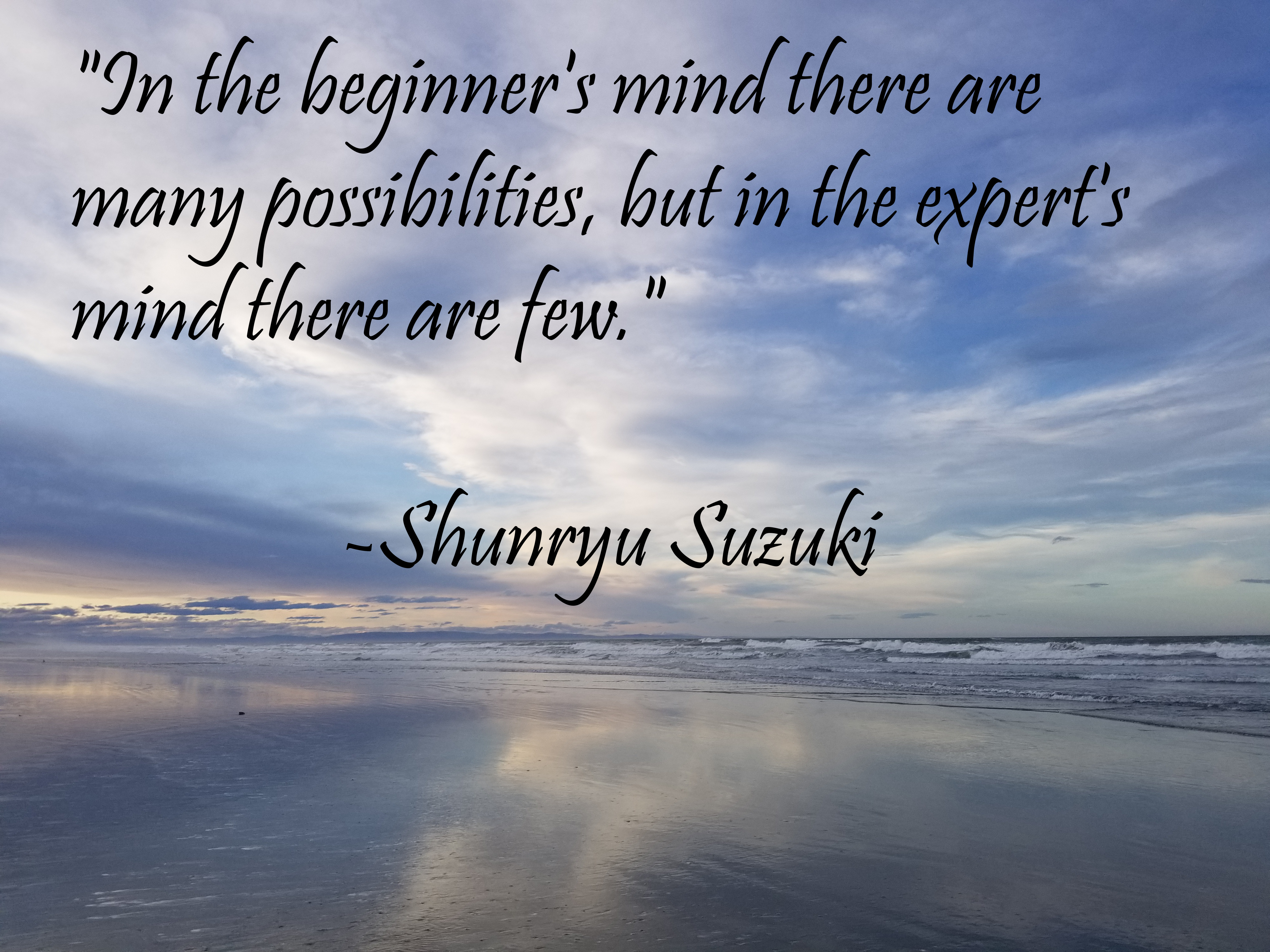“In the beginner’s mind there are many possibilities, but in the expert’s mind there are few.”
Shunryu Suzuki
This is one of the first lines (maybe even the first) from the book Zen Mind Beginner’s Mind by Shunryu Suzuki. It’s a book I’ve gone through 2 or 3 times, usually with a year or two in between. I think it’s a special book that I’d recommend to anyone interested in meditation, spirituality, and personal growth.
This quote comes up for me often in life, for example, whenever I overhear people making declarative statements about things that they don’t really know (which might be more common than agnostic statements). I think about how telling ourselves (often subconsciously or unconsciously) that we are certain about something gives us an often false confidence about life and the world. We might classify people into categories like “good”, “bad”, “smart”, “nice”, “mean”, “trustworthy”, “untrustworthy” etc. We classify political or religious groups. We categorize behavioral rules (“you should always/never____”).
Such simple models of the world give us a feeling that we’ll be able to predict the future. But that feeling has no bearing on the validity of the model, or it’s actual predictive power. Of course, when our model fails us we can always invoke other tricks like confirmation bias and selective-attention bias to convince ourselves that we predicted well. But eventually we run out of mental gymnastics for our self-deception. Shit hits the fan. Our neat and tidy world falls apart to some degree, and we’re forced to reckon with our simple model that creates false negatives and false positives all over the place, misleading us in our feelings and our choices.
So we decide to augment the model, to give it some nuance. We get more conditional about our maps. Rather than simple rules like ____ is ____, we decide that ___ is ___ if ___ or ___ but not if ___. We decide that “bad” people have good redeeming qualities, and “good” people have significant flaws.
This process is a healthy update of our core schema “software”, but we go on living and realize that even our more complex predictive rules fail us sometimes (“I really thought ___ was great, how did I not see ___ coming?”).
There’s a refrain that goes something like, “The more you know, the more you know how much you don’t know.”
It might be tempting to throw out all our rules, since they seem to break with reality so often no matter how much we work on them. But that approach isn’t great either, in addition to it being impossible. We’re hard-wired to make meaning and attempt to predict the chaotic world around us, and it’s difficult to imagine surviving for long if we didn’t make generalizations about life. No, we can’t simply be agnostic about what makes relationships work, our bodies healthy, our finances sound, and objects solidly held to the ground. The complete “beginner” in this sense would be a newborn infant, with no socialization at all, helpless. And even infants aren’t total beginners since we are all born with certain biological survival tendencies (e.g. fear of snakes, pleasure from giving and receiving kindness).
That’s why a “beginner’s mind” is an art. How do we go on acquiring experience (pleasure and pain) and knowledge and maintain it? At the risk of bolstering my expert’s mind, I’d tentatively suggest that the maintenance of beginner’s mind can benefit from:
- Continuing to refine and expand our predictive rules about life, relationships, and reality, so that they work more often and break (fail to predict) less often.
- Adopt an agnostic stance about our rules, and humility and tentativeness about their robustness.
This combination is somewhat paradoxical — we’ve put a decent amount of time and energy and experience into developing a complex and useful model of reality (we’re not infants), but we also hold the model lightly and stay open to it’s continual potential wrongness. We recognize that, no matter how good our model of the world is, there could be (and most certainly are) orders of magnitude more missing model and uncharted territory that we don’t know anything about.
I’m reminded of video games in which the unexplored parts of the world remain dark while the explored parts are lit and mapped out. A beginner’s mind means that we remain agnostic about what percentage of the world/reality that we have mapped out. We don’t know if it’s 50% or 10% or 1% or 0.00001%.
It’s a bit like our own personal scientific method. I think (tentatively of course) that the true expert scientist investigator has a strong beginner’s mind, because they are able to recognize that the unconsidered possibilities likely outweigh and outnumber the considered ones. Einstein proved Newton’s models of gravity were only approximations. The same has been proved about Einstein’s theories. And “proved” is a expert’s mind word… fine to use, but our beginner’s mind remembers that any “proof” can later be disproven.
I have a sense that I tend to be more of an agnostic on most things than most people. But I still look at the world and try to make sense of it. I can even come across as set in my beliefs, but I think that’s mainly because it takes me some time to outline what they are, and they usually aren’t simple. If another person has the time to understand them and shows me where they need further refinement or deletion, I’m grateful.
